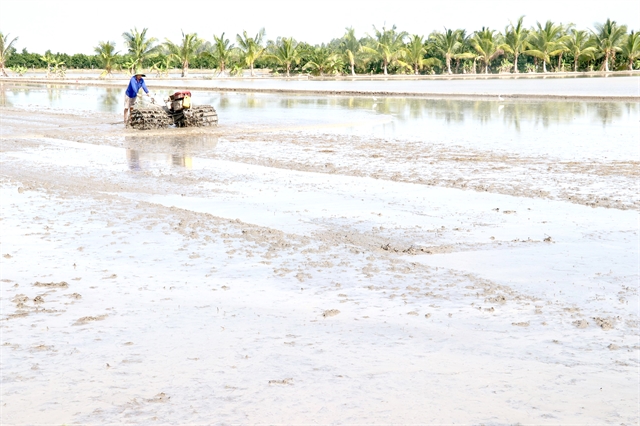 Society
Society

The Cửu Long (Mekong) Delta province of Đồng Tháp is expanding its use of information technology (IT) and advanced farming techniques to restructure agricultural production and achieve sustainability.

|
| Ploughing rice fields in Đồng Tháp Province’s Thanh Bình District. Đồng Tháp is expanding the use of advanced farming techniques and machinery in agricultural production. VNA/VNS Photo Nguyễn Văn Trí |
ĐỒNG THÁP – The Cửu Long (Mekong) Delta province of Đồng Tháp is expanding its use of information technology (IT) and advanced farming techniques to restructure agricultural production and achieve sustainability.
Among the models being used is an "ideal rice farming model" with modern facilities and smart fertiliser.
The "My home mango tree” model and the “My orchard orange tree” farming models sell fruits of a whole mango tree or orange tree to consumers online.
Other initiatives include computer chips to manage parent tra fish to produce fry, an app with information about diseases of animals, fruit-growing areas with production unit codes for export purposes, and cultivation of organic vegetables.
Đồng Tháp is the country’s first province chosen to implement the country’s agriculture restructuring plan. It has developed many effective farming models, which have improved incomes for farmers.
Nguyễn Hồng Sự, chairman of the Cao Lãnh District People’s Committee, said the district is Đồng Tháp’s first locality applying IT in agriculture. It uses the “My home mango tree” model and ideal rice farming model.
Launched in 2016 by the Mỹ Xương Mango Co-operative in Cao Lãnh District, the “My home mango tree” model sells fruits of a whole mango tree planted to Vietnamese good agricultural practices (VietGAP) standards directly to customers through its website.
Each mango tree is identified by a number, and customers can view the current status of the mango tree on the website.
Buyers have to pay VNĐ3- 5 million (US$130 - 216) a year to buy a mango tree sold under the “My home mango tree” model. The price is calculated based on the yield in previous years of the sold mango tree.
Buyers can get 100 – 150kg of mangoes for a year from their tree, or 70 per cent of the quantity guaranteed in the contract if there is a poor harvest.
When a tree is sold, the owner of the mango tree tends the tree, harvests the ripe fruits and sends them to the buyer.
The selling of mango trees on the website offers co-operative members a profit 1.5 – 2 times higher than selling mangoes to traders.
The Mỹ Xương Mango Co-operative has sold 420 mango trees to buyers in Đồng Tháp and other provinces and cities nationwide, including HCM City and Hà Nội.
Last year, the province started its first advanced rice farming model that uses modern techniques in all production stages and irrigation water efficiently.
The model is being implemented by the Mỹ Đông 2 Commune Co-operative in Tháp Mười District. The co-operative is growing 570ha of rice.
Under the model, the co-operative’s farmers use machines and smart devices for sowing seeds, fertilising, harvesting and post-harvest handling.
The co-operative’s farmers also use slow -release fertiliser in soil and use smartphones to monitor and control the irrigation of their fields to save water.
They also use smart devices to monitor brown plant hoppers in rice fields and drones to spray pesticides.
The model has helped farmers increase profit by VNĐ10 million ($430) per hectare a crop compared to traditional rice farming methods.
Bùi Văn Sơn, head of the Tháp Mười District Bureau of Agriculture and Rural Development, said the model has helped farmers cut production costs by reducing the quantity of seeds, fertiliser and pesticides.
“The model also protects the natural enemies of rice pests and minimizes the adverse impact on the environment,” he said.
Ngô Phước Dũng, director of Mỹ Đông 2, said: “The model is being expanded in many localities.”
The province’s Department of Agriculture and Rural Development is co-operating with localities to train farmers in advanced techniques so they can expand these farming models.
The department has encouraged farmers to grow their crops to VietGAP standards. The province has 100ha of vegetables and 444ha of fruits grown under VietGAP, global GAP, or other food safety standards, according to the department.
Around 5,870ha of fruit growing areas have been granted production unit codes for export purposes. Most of these areas grow mango, longan, dragon fruit, jackfruit and rambutan.
Each fruit growing area with a production unit code has a minimum of 10ha, and grows only one type of fruit to VietGAP or other equivalent standards.
Key products
As an agrarian province, Đồng Tháp has identified rice, mango, flowers, ornamental plants, tra fish and ducks as key agricultural products in its agricultural restructuring plan.
Đồng Tháp is the largest producer of mango, flowers, ornamental plants, tra fish and ducks in the delta. It is also one of the delta’s largest rice producers.
In rice production, the province reached a production value of VNĐ21 trillion ($911 million) last year, up VNĐ3 trillion against 2017, according to the Department of Agriculture and Rural Development.
The province’s average rice yield last year increased by 383kg per hectare compared to 2017.
The province’s key products are exported to many markets. Fresh mangoes are exported to the US, EU, Russia, South Korea, Australia, and Japan, among others.
The province’s mangoes are processed into many products like dried mango, frozen mango, mango wine and mango glutinous rice paper.
The value of agricultural production accounts for 30 per cent of the province’s total economic value. Agriculture has an average growth rate of 3 per cent each year and creates jobs for 50 per cent of the province’s total workforce. – VNS




